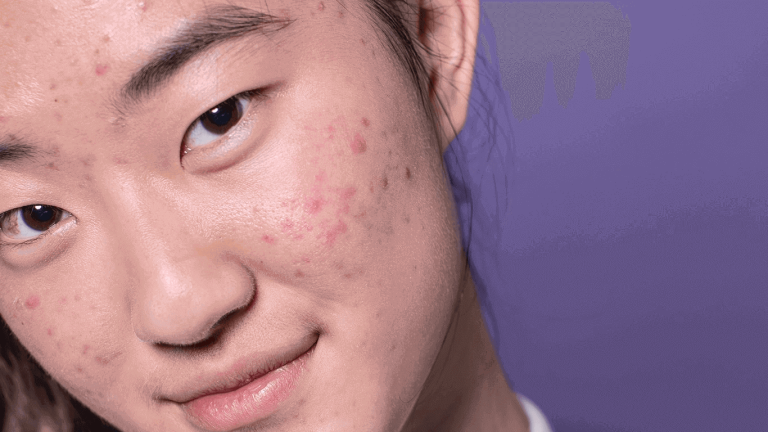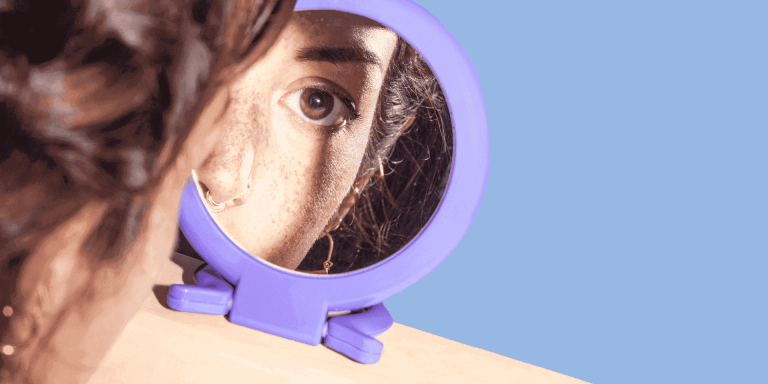How it works:
Share your skin goals and snap selfies
Your dermatology provider prescribes your formula
Apply nightly for happy, healthy skin
How it works:
How it works:
Share your skin goals and snap selfies
Your dermatology provider prescribes your formula
Apply nightly for happy, healthy skin
How it works:
What’s causing your uneven skin tone — and how can you treat it?
If you're aiming to treat uneven skin tone, you should focus on detecting the cause of it first.



There are many different causes of uneven skin tone (rosacea, vitiligo, underlying immune conditions, etc.), and we cannot get into all of them in this article. This article will cover some aspects of uneven skin tone, but if you have any questions/concerns specific to your skin, you should reach out to your licensed medical provider.
So you've noticed discolorations or dark spots developing on your skin. Don’t panic—an uneven skin tone is quite common, especially as you age, and it usually isn't a major health risk.*
Maybe your uneven skin tone doesn’t bother you—in which case, great! But dark spots or uneven tones are totally normal and nothing to be ashamed of. That said, they might make some folks feel a little self-conscious. So, they may want to hide or get rid of them —and that's ok, too.
Luckily, it’s possible to help reduce the appearance of these dark spots. We're here to help you figure out what may be causing your uneven skin tone and get you on track to a solution.
*Some irregular discolorations may indicate more serious issues, like melanoma. Please consult your healthcare provider if you’re unsure of the cause of your discolorations or have any concerns.
What is an uneven skin tone?
Have you ever asked, "Why are my cheeks lighter than the rest of my face?" or "Why is my skin two different colors?" Maybe you've even noticed spots with an almost gray or yellow skin tone and wondered what, exactly, they are.
The phrase "uneven skin tone" is a blanket term that can describe many different conditions (more than we could possibly include in one blog post!). A few of these conditions are discussed below.

Acne
By far the most common skin condition, acne affects up to 50 million Americans every year. And it's not just teens who experience this condition—adult acne is becoming increasingly prevalent. It’s particularly common in women, affecting up to 15% of them.¹ Acne can result in red marks on the skin, and even after it heals, red or brown marks (post-inflammatory erythema and post-inflammatory hyperpigmentation) can remain.
Scars
Scarring is the body's natural response to injury or inflammation. Scars can be categorized as hypertrophic (raised but confined to the injured area),² keloidal (similar to hypertrophic but not confined to the injured area),³ or atrophic (depressed indentations sometimes referred to as "pockmarks").⁴
Hyperpigmentation
Most often caused by sun damage (and sometimes called sun spots), hyperpigmentation is the overproduction of melanin (the natural pigment in our skin). It includes dark spots, like freckles, age spots, and melasma that commonly appear on the face, arms, and shoulders.⁵
Redness or inflammation
Sometimes our skin can appear red or inflamed due to a rash (for many different possible reasons), an eczema flare-up (atopic dermatitis), an allergic reaction, or some other itchy irritation. Usually temporary, redness and inflammation can sometimes indicate a more serious condition.
Rough, dry skin
Sometimes "uneven skin tone" may mean "uneven skin texture," such as rough, dry patches of built-up, dead skin cells. Exfoliation and a good moisturizer might help, but if your condition persists, you might want to get a professional assessment.
What causes an uneven skin tone?
To make things just a bit more confusing, there are many possible causes of an uneven skin tone.
Some potential causes include:
Environmental conditions: Unprotected sun exposure is a top cause of hyperpigmentation (e.g., sun spots and melasma), so use that sunscreen! Cold temperatures and the wind can also lead to reddened and rough skin.
Bacteria or fungi: Microorganisms are everywhere, and sometimes they can affect the condition of your skin. Some examples of fungi and skin conditions that can result in uneven skin tone include Tinea⁶ (commonly known as ringworm), eczema,⁷ and pityriasis rosea⁸ (or “Christmas tree rash”).
Medication side effects: You won't know your body's reaction to certain medications until you take them (although some medications are more likely to trigger a skin reaction than others). Discuss any side effects you experience with your healthcare provider.
Harsh skin care products: Those alcohol-based cleansers that dry the skin out and make your face feel tight? Yeah, those might lead to redness and irritation.
Overwashing: Too much of a good thing can irritate your skin and become counterproductive. We typically suggest washing your face 1-2 times per day.
Clinical conditions: Sometimes, clinical conditions (e.g., rosacea, melasma, lupus, or thyroid disorders) can result in uneven skin tones. A healthcare provider can help diagnose and manage these conditions.
So how can you know what's causing your uneven skin? The best way to accurately assess your skin care needs is by having a consultation with a licensed dermatology provider.
Uneven skin tone treatment
Now you might be asking how to fix your uneven skin tone. Well, while we don't want to call it "fixing"—because your skin is not broken!—you do have many treatment options to consider. That said, the treatment will really depend on what’s causing your uneven skin tone. If you have rosacea, your treatment will be very different than if your redness is simply caused by harsh skincare products.
Here are just a few treatment recommendations you might get from your dermatology provider:

Retinoids
These derivatives of vitamin A can treat hyperpigmentation by encouraging skin cell renewal and collagen production. You can get tretinoin, a prescription retinoid, in your personalized formula from Curology. Talk to your dermatology provider to find out if it’s right for you!
Alpha-hydroxy and beta-hydroxy acids (AHAs/BHAs)
These acids are used for chemical peels and removing dead skin cells, but be careful—excessive chemical exfoliation can cause its own problems (like dryness and irritation).
Hydroquinone
Hydroquinone is a prescription medication for dark spots and other forms of hyperpigmentation. There are some potential risks, though—hydroquinone isn’t safe for everyone, especially pregnant or nursing mothers.
Natural remedies
There are several “natural” remedies that may also be helpful for certain conditions. These include hydrating oils, vitamin C serums, and oat straw extract. These remedies are not to be confused with DIY "home remedies," as some of those may cause more problems.
Tackle your uneven skin tone
There are many factors to consider when it comes to finding the best treatment for your uneven skin tone. An online assessment might be just what you need to determine the root causes and which treatment path is best for your needs.
Get your personalized skincare routine with Curology
Get your personalized skincare routine with Curology


Although Curology doesn't offer treatment for every condition, we're still here to help. Our licensed dermatology providers are happy to answer your questions and help you find a personalized solution. All you need to do to get started is take our quick skin quiz. Snap a few pics, answer a few questions about your skin and medical history, and let us do the detective work. We can match you with a licensed dermatology provider to create a personalized regimen based on what your skin needs.
Skincare is a journey—start your Curology trial now*.
FAQs
Sometimes, an uneven skin tone will clear up on its own over time; however, it really depends on the underlying cause(s).
Everyone's skin is different, and a product or routine that works for one person might not be as effective for another. That's why it's always best to consult a licensed dermatology provider.
Yes! The dermatology providers at Curology.com are available to speak with you right now and can help steer you in the right direction. We're here to help you find a personalized skincare solution.
P.S. We did the homework so you don’t have to:
American Academy of Dermatology. (n.d.). Skin conditions by the numbers. https://www.aad.org/media/stats-numbers
Gabriel V. (2011). Hypertrophic scar. Physical Medicine and Rehabilitation Clinics of North America, 22(2), 301-310. DOI: 10.1016/j.pmr.2011.02.002. PMID: 21624722.
American Academy of Dermatology. (n.d.). Keloid scars: Causes. https://www.aad.org/public/diseases/a-z/keloids-causes
Giavina-Bianchi, M., Dias Azevedo, M. F., & Cordioli, E. (2022). Clinical features of acne in primary care patients assessed through teledermatology. Journal of Primary Care & Community Health. DOI: 10.1177/21501319221074117
American Osteopathic College of Dermatology. (n.d.). Hyperpigmentation. https://www.aocd.org/page/Hyperpigmentation
Lewis, Sarah. Ringworm (Tinea). Healthgrades. (Aug 24, 2021).
Lewis, Sarah. Eczema. Healthgrades. (Jan 25, 2021).
Lewis, Sarah. Christmas tree rash (Pityriasis rosea). Healthgrades. (April 10, 2021).
Melissa Hunter is a board certified family nurse practitioner at Curology. She received her MSN from George Washington University in Washington, DC.
*Cancel anytime. Subject to consultation. Results may vary.

Curology Team

Melissa Hunter, NP-C